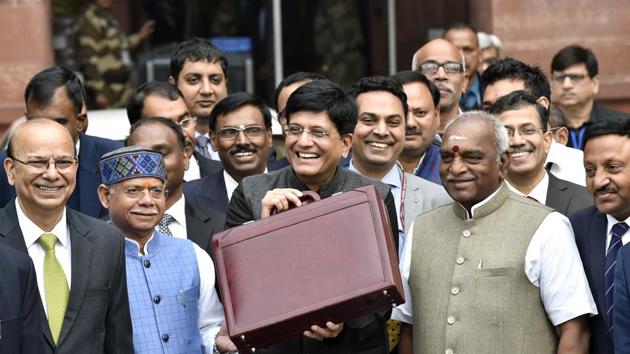This is a forward-looking budget
Indirect taxes are headed towards stability, insulated from annual changes, though GST is still work in progress. Once the Task Force on Direct Taxes submits its recommendations and those are accepted, direct taxes should also become stable and certain.
The Union budget, interim or otherwise, takes up just one day out of 365 (366). The government doesn’t stop functioning on other days. Therefore, the budget doesn’t hang loose. It is part of broader government initiatives, those in the past and those contemplated in the future. Especially because this is the last budget before the general elections, stock taking of the last five years is useful. As mentioned in the speech, these initiatives are sound macroeconomic management (the low inflation record is often missed), indirect tax reform (Goods and Services Tax), reducing tax compliance costs, banking and exit (insolvency and bankruptcy code), anti-corruption initiatives, cleanliness, physical infrastructure (roads, railways, civil aviation, electricity), social infrastructure (education, health), fostering entrepreneurship (MUDRA), digitisation, direct benefit transfers (DBT) and formalisation. All these create an enabling environment for growth, entrepreneurship, productivity increases and employment generation. Every budget speech doesn’t necessarily lay out a roadmap, weaving the past and the present (2019-20) into the future. In this case, we have aspirations for 2022 (including universal access to toilets, water and electricity) and 10 dimensions for 2030 (physical and social infrastructure, digitisation, reduction in pollution, rural industrialisation, clean rivers, coasts, outer skies, self-sufficiency in food, health and better G2C (government to citizen) interaction).

How does the 2019-20 budget speech fit into this? The temptation for any government, not just governments heading towards elections, is to indulge in fiscal profligacy. After all, the costs of profligacy are borne by future governments, not current ones. Since 2014, the track record of this government on fiscal marksmanship (adherence to targets) has been remarkably good, a phenomenon critics will also acknowledge. For 2018-19, revenue deficit/GDP ratios are 2.2% for both BE (budget estimates) and RE (revised estimates) and that figure is also accepted for BE of 2019-20. For the fiscal deficit/GDP ratio, BE of 2018-19 had 3.3%, while RE of 2018-19 and BE of 2019-20 both have 3.4%. The speech tells us this is because of income support to farmers. “If we exclude this, the fiscal deficit would have been less than 3.3% for 2018-19 and less than 3.1% for year 2019-20.” The numbers driving 3.4% in 2019-20 are credible enough — whether it is the reasonable nominal GDP growth of 11.5%, or the disinvestment target of Rs 90,000 crore. This fits in with the fiscal marksmanship point. Sure, one could have wished for lower government borrowings and a lower fiscal deficit/GDP ratio. But that’s a consequence of the income support scheme. The speech also states, “We have maintained the glide path towards our target of 3% of fiscal deficit to be achieved by 2020-21.” With the income support scheme, 3% in 2020-21 is probably undoable. Reduction by more than 0.5% of GDP a year is tough.
How do we look at the income support scheme? One way of looking at it is in terms of a social safety net, extremely difficult to implement in a country with informal employer-employee relationships and self-employment. A social safety net can be defined in various ways. Ayushman Bharat, disability coverage, the New Pension Scheme, maternity benefits and the new pension scheme for unorganised sector workers (announced in the budget) are elements of this. Since farm incomes are volatile and fluctuate every year, PM-KISAN (income support scheme) can also be interpreted in a social safety net context. Any such exercise has to be work in progress, not something achievable overnight. In a country where land records (meaning agricultural land) are nowhere near perfect everywhere, providing the proposed sum to landholding families with cultivable land less than two hectares will itself not be easy. Rs 6,000 is too little. What about tenants? What about agricultural labourers and others who earn a living from land? Surely, two hectares being “vulnerable” is a function of use being made of the land and whether it is irrigated or dry land. These are valid questions, but the better shouldn’t become the enemy of the good.
This leaves taxes, historically identified with budgets. Indirect tax changes are the GST Council’s right. On direct tax reform, there is a task force. I have mentioned compliance cost reduction (processing of returns and refunds, anonymous verification and assessment). Pending report of the task force, expectations about rate changes were unwarranted. Therefore, we have a tax rebate up to Rs 5 lakh (more with investments and other deductions), standard deduction, notional rent, TDS (tax deducted at source) and capital gains. Indirect taxes are headed towards stability, insulated from annual changes, though GST is still a work in progress. Once the Task Force on Direct Taxes submits its recommendations and those are accepted, direct taxes should also become stable and certain. Benjamin Franklin said nothing in the world is certain, except death and taxes. Tax rates will also become certain. That’s in the future. In the interim, the 2019-20 interim budget weaves in what the government has done in the past with what it proposes for the future.
Bibek Debroy is chairman of Economic Advisory Council to the Prime Minister and a member of Niti Aayog.
The views expressed are personal






